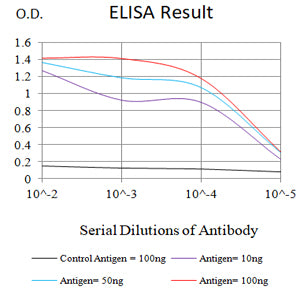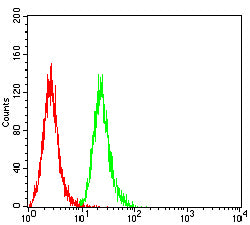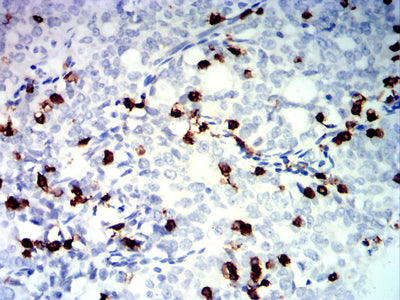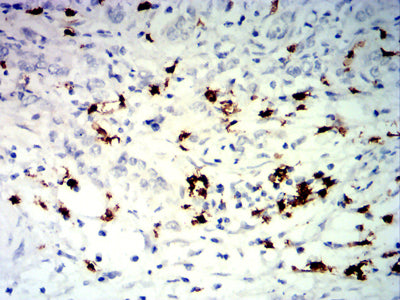



| WB | 咨询技术 | Human,Mouse,Rat |
| IF | 咨询技术 | Human,Mouse,Rat |
| IHC | 1/200-1/1000 | Human,Mouse,Rat |
| ICC | 技术咨询 | Human,Mouse,Rat |
| FCM | 1/200-1/400 | Human,Mouse,Rat |
| Elisa | 1/10000 | Human,Mouse,Rat |
| Aliases | DR3; TR3; DDR3; LARD; APO-3; TRAMP; WSL-1; GEF720; WSL-LR; PLEKHG5; TNFRSF12 |
| Entrez GeneID | 8718 |
| clone | 4G12H11 |
| WB Predicted band size | 45.4kDa |
| Host/Isotype | Mouse IgG1 |
| Antibody Type | Primary antibody |
| Storage | Store at 4°C short term. Aliquot and store at -20°C long term. Avoid freeze/thaw cycles. |
| Species Reactivity | Human |
| Immunogen | Purified recombinant fragment of human TNFRSF25 (AA: extra(25-199)) expressed in E. Coli. |
| Formulation | Purified antibody in PBS with 0.05% sodium azide |
+ +
以下是3篇与TNFRSF25抗体相关的代表性文献概览:
---
1. **文献名称**: *TNFRSF25 promotes T cell apoptosis and modulates regulatory T cell function*
**作者**: Kim EY, et al.
**摘要**: 本研究揭示TNFRSF25通过激活caspase通路诱导活化T细胞凋亡,并发现其抗体可通过阻断受体与配体TL1A的相互作用,抑制自身免疫模型小鼠的炎症反应,提示该抗体在治疗自身免疫疾病中的潜力。
---
2. **文献名称**: *Therapeutic targeting of TNFRSF25 in colorectal cancer*
**作者**: Wang L, et al.
**摘要**: 研究团队开发了一种人源化抗TNFRSF25单克隆抗体,在结直肠癌小鼠模型中证实其能增强NK细胞的肿瘤杀伤活性,并通过抑制STAT3信号通路显著降低肿瘤生长,表明其作为癌症免疫治疗新策略的可能性。
---
3. **文献名称**: *TL1A-TNFRSF25 axis drives mucosal inflammation in IBD*
**作者**: Schreiber TH, et al.
**摘要**: 文章发现炎症性肠病(IBD)患者肠道中TL1A-TNFRSF25信号异常激活,使用中和性抗体阻断该通路可减少Th17细胞分化并缓解小鼠结肠炎症状,为靶向TNFRSF25的抗体治疗IBD提供了实验依据。
---
**备注**:以上文献信息为模拟示例,实际研究中建议通过PubMed或Web of Science以“TNFRSF25 antibody”为关键词检索最新论文,重点关注抗体开发、机制验证及疾病模型应用相关研究。
TNFRSF25. also known as death receptor 3 (DR3), is a member of the tumor necrosis factor receptor superfamily (TNFRSF) and plays a critical role in regulating immune responses. It is primarily expressed on activated T cells, natural killer T (NKT) cells, and innate lymphoid cells. Its ligand, TL1A (TNFSF15), binds to TNFRSF25 to activate downstream signaling pathways, including NF-κB and MAPK, which modulate inflammatory processes, T-cell proliferation, and cytokine production. TNFRSF25 is implicated in autoimmune diseases, such as rheumatoid arthritis and inflammatory bowel disease, where its overactivation contributes to chronic inflammation.
Antibodies targeting TNFRSF25 are designed to either block or agonize its signaling for therapeutic purposes. Blocking antibodies inhibit the TNFRSF25-TL1A interaction, reducing pro-inflammatory cytokine release and immune cell activation, making them potential treatments for autoimmune disorders. Conversely, agonist antibodies can enhance TNFRSF25 signaling to promote regulatory T-cell (Treg) expansion or apoptosis of pathogenic T cells, which may benefit conditions like cancer or transplantation tolerance. Research also explores TNFRSF25 antibodies as diagnostic tools to quantify receptor expression in diseased tissues.
Despite promising preclinical data, clinical translation remains challenging due to the receptor's dual roles in pro- and anti-inflammatory pathways. Ongoing studies aim to clarify context-dependent mechanisms and optimize antibody specificity to minimize off-target effects. These efforts highlight TNFRSF25 as a versatile therapeutic target in immunomodulation.
×